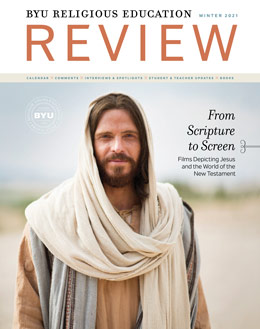Students Grow and Thrive despite Pandemic Challenges
Carmen Cole
Carmen Cole (carmen@byu.edu) is a designer at the Religious Studies Center.
Six different BYU students. Six different perspectives. Yet all are united in the experience we call the COVID-19 pandemic.
Before the pandemic, students freely roamed BYU campus, workplaces, social spots, businesses, and church buildings. Now they are physically six feet apart. School, work, and church services have been limited in size or moved to online formats. Wearing a mask to the bank is no longer frowned on—it is required.
Life Changes
The pandemic has impacted some students’ lives more than others and each in different ways. Jae Martinez, a sophomore from Mansfield, Texas, studying psychology, and Carrie Greene, a sophomore from Orem studying elementary education, were both serving Latter-day Saint missions when the pandemic hit.
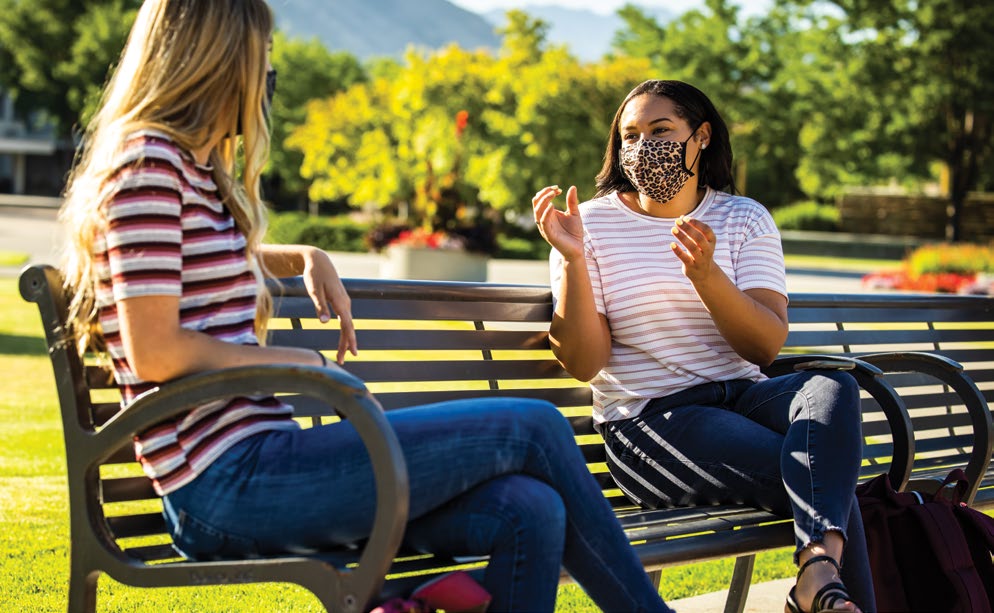 Photo by Jaren Wilkey, © 2020 BYU Photo.
Photo by Jaren Wilkey, © 2020 BYU Photo.
“The pandemic came when I was halfway through my mission,” Jae says. “I felt like the floor was pulled right out from under my feet. I had to learn all over again, but in a completely different way, how to be a missionary. Then upon coming home, I had to learn all over again—but in a completely different way—how to be a college student.”
Carrie also experienced changes as a missionary. “I was on my mission when the pandemic first broke out, and I was able to see how it greatly changed missionary work,” she says. “We weren’t able to go out and knock on doors, and finding new people was tricky at first.” Now that she’s home and back at school, “I miss being able to do more spontaneous things; you often have to make reservations or call your friend or family member before just showing up.”
Emily Warner would probably agree with that. A junior from Tehachapi, California, studying biodiversity and conservation, Emily says, “It’s been hard staying inside and having to do school online, and it’s kind of sad sometimes when a lot of the activities are limited.”
“Fortunately, I haven’t had any family members or friends who have died or been seriously ill because of COVID, so for me, life itself is still very much the same,” says a married student who preferred to remain anonymous. “But I recognize that life has become very different for many people. I get up every day, and I sleep every night. My husband and I are still in school, and we still have our jobs and our health. Other than the minor inconveniences of mask wearing and stores closing early, we haven’t been too affected at all.”
One element of life that has changed for Cara Nickels, a senior from St. George studying English, is certainty. “Prior to last February, I confidently made plans weeks and months in advance, purchasing tickets for flights, applying to study abroad programs, seeking jobs, et cetera,” she says. “Yet so much was canceled by the pandemic, and so much continues to balance precariously on the verge of cancellation. It's difficult to predict what will come next and how the pandemic may continue to affect our lives, and that has made it difficult to plan for the future.”
For Isaac Romer, a first-year student from Lorena, Texas, studying music education, “the most obvious difference is found in my social life. I loved hanging out with my friends in my classes, but now that almost never happens. It's been an entire semester and a half, and my social interactions are mostly with my roommates, my family home evening group, my ministers, and my siblings that live on campus.”
“The pandemic has certainly tested my self-reliance at times,” Isaac continues. “I think of the devotional that President Worthen gave before the start of school at the end of the summer [2020] where he said, ‘If we emerge from the pandemic unscathed but unchanged, we will have missed out on the full benefit of this unique experience.’ Luckily now I have some really awesome roommates that have this same mindset, so being with them more often has only helped me.”
For most of the students interviewed, the people they are able to associate with during the pandemic have been a blessing, bringing deeper and better relationships.
Carrie says, “The upside is that those who I do socialize with have become some of my closest friends; we have really had to prioritize spending time together. Dating and friendships seem less casual and more meaningful and purposeful.”
With the switch to online instruction, Cara “was able to take classes remotely while spending time with family. Instead of returning to my parents’ home, however, I went and lived with my oldest sister for nearly half a semester. Living with her and her kids was a real blessing, and I feel lucky to have a fairly big part in the lives of her children in particular as they grow up."
Jae adds, “While people are now more physically distant, it seems that everyone is emotionally more connected. This may be due to the fact that every single human being on the planet right now has at least one shared experience. That gives absolutely everyone something to connect with. I definitely miss hugs, and people being less physically guarded.”
God Is in the Details
Along with the adjustments in social life, education, and physical distancing, we wanted to know how students are faring spiritually. Many students mentioned how these trials have helped them grow. They listed prayer, testimony, journaling, scripture study, devotionals, religion classes, serving others, and having the proper mindset as resources that have helped.
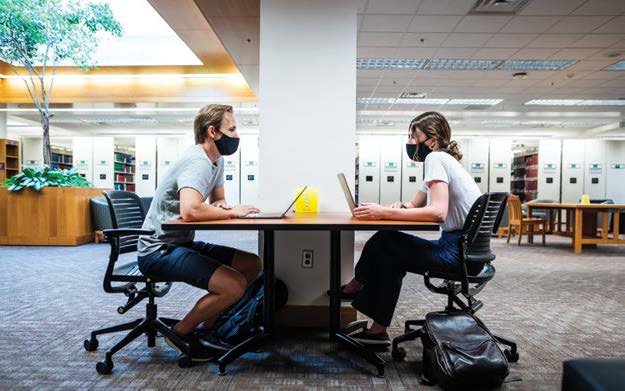 Photos by Nate Edwards and Tyler Richardson, © 2020 BYU Photo.
Photos by Nate Edwards and Tyler Richardson, © 2020 BYU Photo.
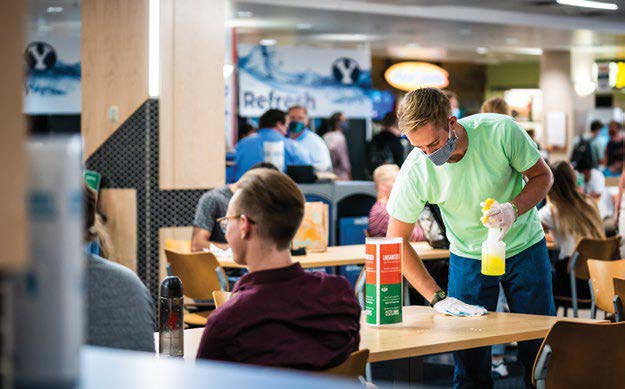
The dramatic changes in Jae’s missionary and subsequent college life were very humbling for her. “The pandemic has impacted my religious life drastically, in all ways for the better,” Jae says. “These [experiences] have humbled me because I saw how in life we can become comfortable and stagnant. We tend to cling to routines and what is constant. However, the only constant is the gospel. If the pandemic has taught me anything, it’s that. Life as you know it could change in an instant. This inspired me to change the way I study that gospel. I started not only looking for what I need now, but truly tried to seek revelation from Heavenly Father on what I need for the future. I have learned the value of being prepared.”
Prayer and scripture study have helped Jae the most. She comments, “All the crazy things that have happened in the scriptures in the past don’t seem so crazy anymore. I am more willing to seek comfort and guidance. The constant reminder that God fulfills his promises gives me peace. No matter how turbulent times may be, we can count on him.”
Carrie has appreciated the power of prayer during this time. “One thing that has helped me spiritually is to be genuine in my prayers about my challenges and frustrations, but also about my victories and joys, and then listen for help and answers from God,” she says. “I also have taken more time to ponder my testimony and then express it through poetry, art, and journaling. I know those things will be a really valuable reminder to me in the future when I’m experiencing other trials.”
Emily has also found herself journaling more since the pandemic hit. “I think probably the biggest change is that I’ve started writing in my journal more about the things I’m grateful for, and reading my scriptures, and trying to reach out to others where I can. I’m trying to do more service and recognize that we’re all in this together, so it’s good to help one another.”
Cara mentioned the trials associated with online church but has been grateful for personal study and religion classes to supplement the Sunday meeting changes. “It was really difficult not being able to attend church in person for so long,” she says. “Sundays began to feel like just another Saturday, and it became harder to keep the Sabbath. My religion classes did help with that, since being assigned conference talks and religious readings each week filled part of the gap left by not having church. There has been a greater emphasis on personal study and an outpouring of resources that have been very useful.”
For Better or Worse
Most of the students think the pandemic has changed them overall for the better. An introvert, Cara said, “Now that I don’t have social events forcing me to go out and socialize, the circle of people I talk to has grown smaller and smaller. Yet it’s also made me miss such socialization, so maybe once pandemic conditions lighten, I’ll be brave enough to be a little more extroverted as I try to recover my social life. I do also think the pandemic has made me more resilient in some ways. It brought so many disappointments and worst-case scenarios, but I’ve also lived through them, and that’s not nothing.”
The pandemic has helped Carrie become more compassionate. “The pandemic has helped me to see the sufferings of others with more empathy; I want to help them where I can and comfort them,” she says. “The pandemic has also helped me to feel that yearning to hear from our living prophet and apostles.”
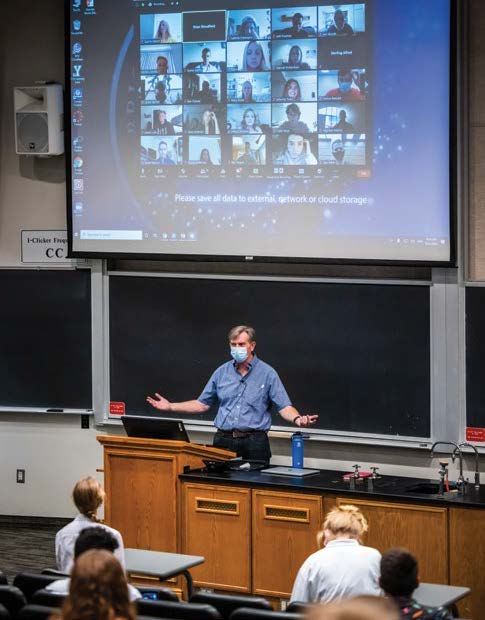 In-person and virtual classes. Photo by Nate Edwards, © 2020 BYU Photo.
In-person and virtual classes. Photo by Nate Edwards, © 2020 BYU Photo.
“Because of the politics that were forced into the pandemic (and because of all the social unrest of 2020), the year has been more exhausting mentally and emotionally,” says an anonymous student. But “I think all of the political/
Emily says these experiences have helped her to not take things for granted, and she recognizes the hand of God more in her life. For example, “Sometimes I’ll get lonely or have a bad day, and I’ve had friends that have texted me at the right moment or called me just when I needed it.”
The pandemic has changed Jae “absolutely” for the better. “I feel like my view of the gospel, and of humanity, has been expanded,” she says. “I understand the value of stillness, which is hard to learn in a very busy and chaotic society. I have spent a lot of time with my thoughts, which has allowed me to take inventory on them and change the things I don’t like or [that] aren’t right.”
Isaac perhaps said it best. “The pandemic has been like a mission companion: after living with it for a while you start to realize where your weaknesses are. The pandemic has shown me that I am not as social as I thought I once was, because now I have to make a special effort if I want social interaction.” But “the pandemic has changed me for the better.”
Despites the many challenges and changes, it’s good to see ways in the lives of these students in which the “tender mercies of the Lord are over all” (1 Nephi 1:20). Even during a pandemic, BYU students are fighting back—choosing faith over fear—and thriving.
